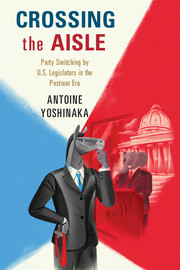Book contents
- Frontmatter
- Dedication
- Contents
- List of Tables
- List of Figures
- Acknowledgments
- PART I
- PART II
- PART III
- PART IV
- 7 Behind the Scenes: The Role of Party Leaders, Rank-and-File Members, and Former Party Switchers
- 8 A “Real-Time” Look into the Decision to Cross the Aisle
- 9 Conclusion
- Appendix A Excluded “Pseudo-Switchers”
- Appendix B Details about Elite Interviews
- Appendix C Data Sources for Chapter 3
- Appendix D Data Sources for Chapter 4
- Appendix E Data Sources for Chapter 5
- Appendix F Data Sources for Chapter 6
- References
- Index
9 - Conclusion
from PART IV
Published online by Cambridge University Press: 05 December 2015
- Frontmatter
- Dedication
- Contents
- List of Tables
- List of Figures
- Acknowledgments
- PART I
- PART II
- PART III
- PART IV
- 7 Behind the Scenes: The Role of Party Leaders, Rank-and-File Members, and Former Party Switchers
- 8 A “Real-Time” Look into the Decision to Cross the Aisle
- 9 Conclusion
- Appendix A Excluded “Pseudo-Switchers”
- Appendix B Details about Elite Interviews
- Appendix C Data Sources for Chapter 3
- Appendix D Data Sources for Chapter 4
- Appendix E Data Sources for Chapter 5
- Appendix F Data Sources for Chapter 6
- References
- Index
Summary
Political parties are essential to the operation of electoral politics and representative democracy. Candidates affiliate with parties, voters support candidates on the basis of this affiliation, and legislative battles are often fought along partisan lines. Because politics is a team sport where the players choose the side with which they affiliate, understanding the factors that lead politicians to affiliate with one party or another is a question of great theoretical and practical import.
Political ambition is also at the heart of representative democracy. By virtue of their desire to win (or retain) office, politicians tend to behave in predictable ways, engaging in actions that increase their chances of electoral success while shying away from behaviors detrimental to their electoral prospects. Reelection, therefore, provides significant constraints on the choice of actions by ambitious politicians.
Yet reelection is not the only objective sought by politicians. Obtaining and yielding power, effecting public policies that reflect one's preferences, and moving up the political ladder are some of the goals that go beyond the narrow reelection motive. As I argue throughout the book, legislators’ decision to switch parties cannot be explained fully by a singular focus on reelection. Crossing the aisle is as much about progressive and intrainstitutional ambition as it is about reelection. This is not to say that legislators switch parties with the intent of losing votes. Rather, what I assume is that switching parties entails significant costs and that politicians may be interested in more than the upcoming reelection. I then derive some predictions regarding elite behavior, which I put to the test with original data from Congress and state legislatures. I also show, empirically, that party switching does come at a significant cost at the ballot box, and I provide both quantitative and qualitative evidence to that effect. It is no coincidence that very few legislators choose to leave their party voluntarily. As it turns out, the act entails much more than donning the other team's gear. The decision to cross the aisle is a complex one, and by focusing so much on the reelection motive, our extant models did not provide a full picture of this decision.
- Type
- Chapter
- Information
- Crossing the AisleParty Switching by US Legislators in the Postwar Era, pp. 222 - 232Publisher: Cambridge University PressPrint publication year: 2015



